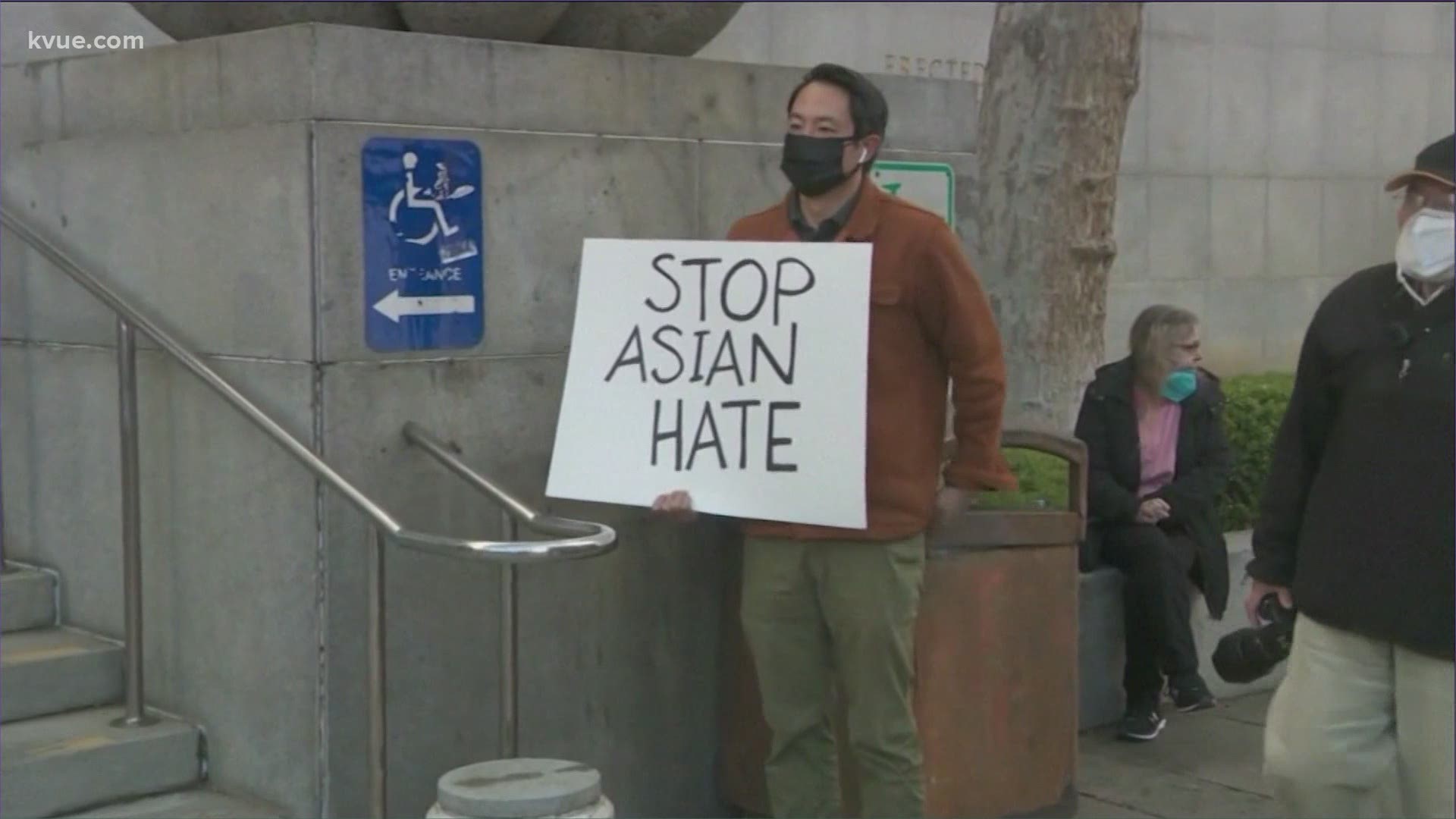AUSTIN, Texas — After the Atlanta-area shootings that killed eight people, six of them being Asian women, Dr. Thuy Ho-Ellsworth felt many emotions.
"Oh, it was really hard, I mean, to see that because these were Asian American females, and it just hits home because you identify with them and when you feel that these are businesses that were specifically targeted for this type of demographic. It's a combination of devastation set in with fear and concern and just immense sadness," Dr. Ho-Ellsworth said.
The foot and ankle surgeon is part of the roughly 8% of Asian American population in Austin, the fastest-growing minority group in the Capital City, according to the Greater Austin Asian Chamber of Commerce.
A population increasing under attack, according to Asian American leaders from across the state.
On Tuesday, those leaders from Austin, Dallas, Houston and San Antonio hosted a Zoom video conference call to announce several initiatives in hopes to better protect Texas' Asian American and Pacific Islander, or AAPI, communities.
Channy Soeur is with Network for Asian American Organizations. He laid out their plan.
"First, work with state and local government to develop safety measures for the Asian community. Second, we will develop a public awareness campaign to combat anti-Asian discrimination. Third, we will encourage volunteerism and donation to empower the AAPI community. Fourth, we will advance public education and awareness about historic discrimination. Fifth, we will call on Gov. Abbott to form a special commission to combat hate crimes in the state of Texas," Soeur said.
According to the Stop AAPI national report, nationwide, there were nearly 3,800 hate incidents from March of last year to last month. Texas was ranked No. 4 in the highest number of incidents with 103 cases.
Organizers cited the following incidents:
- In Austin, an Asian American-owned bakery received threats and harassment after being featured in a viral Eater-Austin article.
- In San Antonio, an Asian American restaurant was vandalized with graffiti, received death threats and online negative reviews after comments on the mask mandate.
- In San Francisco, a 76-year-old woman was punched in the face unprovoked on the main street.
- In Oakland, a 91-year-old man, 60-year-old man and 55-year-old woman were violently attacked in Oakland’s Chinatown.
- In New York City, two Asian women were physically assaulted in two separate subway attacks.
- In San Francisco, an 84-year-old man originally from Thailand was violently slammed into the ground, later resulting in death.
Robert Lee lives in Austin. He said these incidents must stop.
"The recent and growing persecution of the Asian community has brought up painful memories of my own past ... my middle school years spent in Alabama, where I firsthand saw the movement from segregation to integration," Lee said.
For Margaret Chen-Kercher, recent attacks may lead to conversations they never thought they would have.
"My parents actually are in Austin and they were saying that they were going to go to Costco, just to Costco. And I for a moment had this moment of fear because, in Midland a year ago, that a father and that son, they went to Sam's and, you know, something happened to them. And I just, I worry. And then, of course, you know, I have three children. And how do you explain that? I think traditionally we don't have the talk, right, that we hear about African Americans having the talk with their children. And I think maybe that is something that we start we need to start doing," Chen-Kercher said.
Lesley Varghese also lives in Austin. She said she feels another emotion – anger.
"It's outrageous how this incident [Atlanta shootings] was talked about. It is the assumptions of the killer, are outrageous. The perception, the implication that if, in fact, any of these women were sex workers, the implication that that means they deserve violence, is outrageous. I'm angry as a woman. I'm angry as a member of AAPI community. I'm angry as a mother, and I'm angry as a friend," Varghese said.
She reminds us of America's ugly past.
"You know, looking back in history. Right? I mean, the Chinese Americans are the only group to ever be called out by ethnicity and excluded in the Chinese Exclusion Act to come here. But before that, the Page Act actually kept Chinese American women from immigrating because of the assumption that they were sex workers. Does that sound familiar? I mean, it is to say this predates Vietnam and Korea and the militarization that contributes to this culture, that this is old news in a way. And so that's happening. But what is new is, is the virus. The elephant in the room is the virus. And the fact that people who have nothing to do with this are being played from any number of countries in the Asian continent in terms of their origin are being blamed for this," Varghese said.
But Varghese said change is coming.
"This doesn't feel like the other times. I think this is more than a moment for the community. I think this is going to be the start of a movement. I think you have a generation of folks, parents, who didn't speak out, not because they weren't courageous or because they weren't suffering, but because of language barriers and because they were focused on surviving. And I think there is a generation of leadership right now that is ready to fight for their safety and the safety of our kids and our parents and our grandparents," Varghese said.
Last month, Dr. Ho-Elllsworth joined healthcare workers across the nation and posted personal experiences of racism, raising awareness of hate crimes targeting the Asian American community using #HCWFORASIANLIVES, a movement started by Dr. Jennifer Chung.
It was the Vietnamese refugee's way of speaking up and being seen.
PEOPLE ARE ALSO READING:

